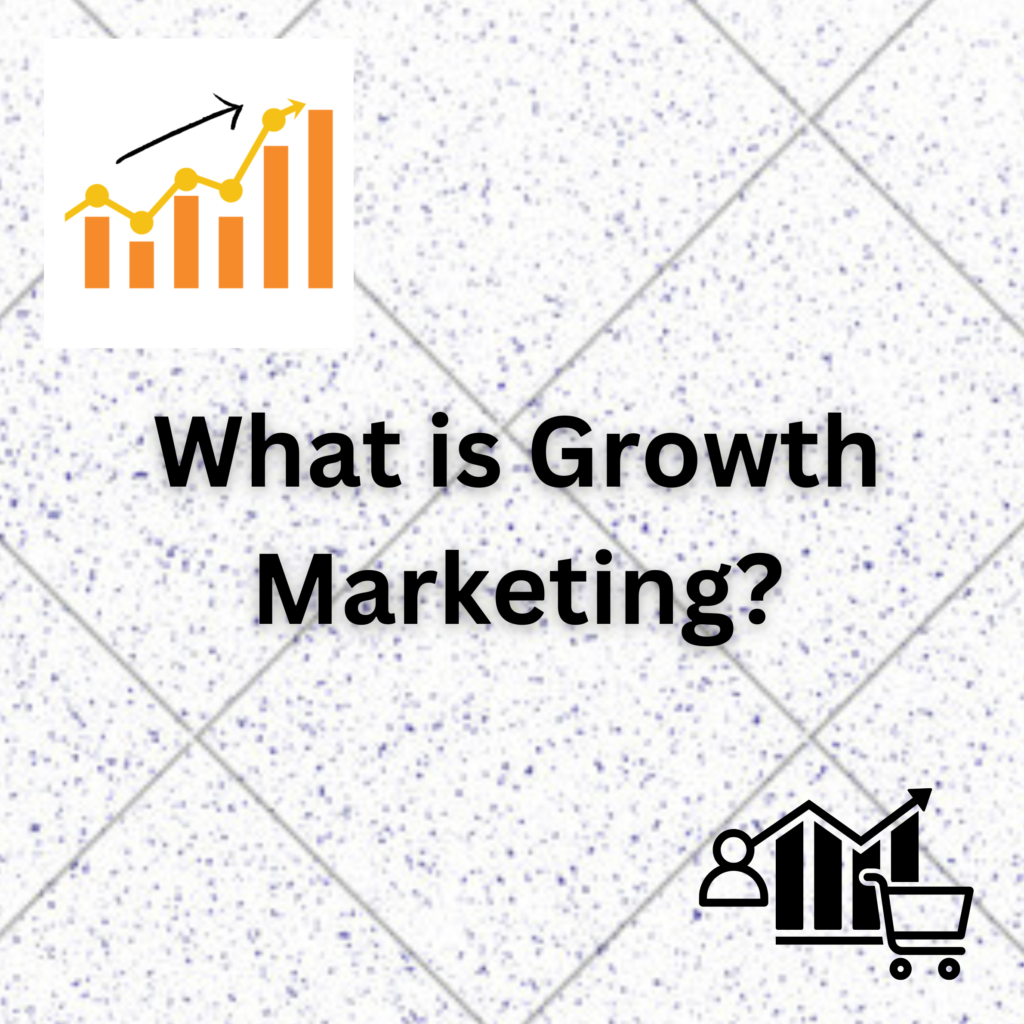What is Growth Marketing? A Complete Guide to Driving Sustainable Business Growth
Introduction
In today’s competitive digital world, businesses must innovate and evolve faster than ever before to stay updated. Marketing strategies focus basically on raising awareness, generating leads, and converting customers. While these are important, they only scratch the surface of what’s needed for long-term success. That’s where growth marketing comes in a holistic approach designed not just to attract new customers but to optimize the entire customer experience, ensuring continuous growth.
So, what exactly is growth marketing? In this article, we will know the meaning of growth marketing, how it is different from traditional marketing, its main focus, and the key strategies you can implement to grow your business faster and safely.
What is Growth Marketing?
Growth marketing is a data-driven, full-funnel approach to customer involvement to your business, retention, and expansion. It focuses on experimenting with different logics and strategies to identify what works better at every stage of the customer routine. The goal is not just to bring in new users but to engage, retain, and turn them into loyal customers of your brand.
In comparison to traditional marketing, which often zeroes in on driving immediate and short term sales or leads, growth marketing takes a long-term goal. It aims to make healthy and deeper connections with customers by optimizing every interaction, from the moment they first hear about your brand to their continued engagement after a sale or service.
In final, growth marketing combines creativity, data analysis, and experimentation to identify scalable growth opportunities for a business.
How is Growth Marketing Different from Traditional Marketing
Traditional marketing and growth marketing share some common goals, such as increasing brand awareness and customer involment, they differ in their approach and scope. Here are the main differences:
- Focus on the Entire Funnel: Traditional marketing often emphasizes the top of the sales funnel, driving awareness and generating leads. Growth marketing, on the other hand, addresses all stages of the funnel from awareness and acquisition to activation, retention, and referral. It seeks to optimize every touchpoint in the customer journey to brand.
- Data-Driven Decisions: Traditional marketing strategies tend to rely more on intuition, brand positioning, and creative content. While these elements are still important, growth marketing is highly data-driven. Growth marketers rely on data and analytics to track, measure, and improve each strategy’s effectiveness, ensuring constant optimization. It tracks the journey of customers to the brand.
- Ongoing Experimentation: Growth marketing involves continuous experimentation. A/B testing, multivariate testing, and rapid iteration are common practices etc. Traditional marketing might contain a campaign and leave it as is, but growth marketers constantly test their strategies to find the most effective solutions for the brand.
- Cross-Functional Collaboration: In traditional marketing, marketers usually work in isolation from other teams and separate from others. In growth marketing, collaboration with teams such as product development, customer support, tech team and sales is crucial. This cross-functional approach ensures that every aspect of the business is aligned with growth objectives and helps business to grow faster.
Core Principles of Growth Marketing
Growth marketing orbit around several core principles that differentiate it from more important strategies. These principles guide the actions and decision-making processes of growth marketers:
- Full-Funnel Focus: Growth marketing is not limited to lead generation or conversion. Instead, it emphasizes optimizing the entire customer funnel from acquisition to retention. This approach allows businesses to generate more long-term value from their customers, leading to sustainable growth.
- Data-Driven Approach: Growth marketers make decisions based on real-time data and insights. They analyze metrics such as conversion rates, customer lifetime value (CLV), customer acquisition cost (CAC), and retention rates to fine-tune their strategies. By leveraging this data, growth marketers can identify bottlenecks and areas for improvement.
- Continuous Experimentation: Successful growth marketing relies on constant testing and iteration. Marketers implement A/B tests, multivariate tests, and other experiments to optimize different strategies and goals. Each experiment aims to improve key metrics, such as engagement or conversion rates.
- Scalability: Growth marketing focuses on identifying strategies that can scale efficiently as the business grows. Whether it’s leveraging automation, viral loops, or referral programs, the goal is to implement initiatives that drive growth in a scalable, repeatable way.
Customer-Centricity: Growth marketing is deeply rooted in understanding the customer. By gathering feedback and analyzing user behavior, growth marketers can build better experiences, cater to user needs, and nurture long-term loyalty.
Key Strategies in Growth Marketing
Growth marketing can be applied using various strategies to your business model, industry, and target audience. Here are some of the most effective growth marketing strategies to consider:
1. Content Marketing
Content marketing remains a fundamental part of growth marketing. The key, however, is creating valuable, relevant content that attracts, engages, and retains your target audience. By producing high-quality blog posts, videos, and social media content, you can increase your visibility, build trust, and nurture relationships with your customers.
2. A/B Testing
A/B testing, also known as split testing, involves running experiments where two versions of a webpage, email, or ad are compared to see which performs better. Whether you’re testing headlines, CTAs (call-to-action), or images, this strategy allows you to optimize based on hard data, not assumptions.
3. Email Marketing
Email marketing is still one of the most effective ways to engage and retain customers. By sending personalized, targeted messages based on customer behavior and preferences, you can build deeper connections and encourage repeat business.
4. Search Engine Optimization (SEO)
A strong SEO strategy is essential for driving organic traffic to your website. Growth marketers use keyword research, on-page optimization, and link-building techniques to improve search rankings and increase visibility.
5. Referral Programs
One of the most cost-effective ways to grow your business is by encouraging your existing customers to refer others. Referral programs incentivize users to spread the word about your product or service, leveraging word-of-mouth marketing to fuel growth. Dropbox’s famous referral program, which offered users extra storage space for referrals, helped them achieve rapid growth.
6. Social Media Advertising
Paid advertising on social media platforms like Facebook, Instagram, and LinkedIn is a powerful growth marketing strategy. By targeting specific audience segments based on demographics, interests, and behaviors, you can reach a large pool of potential customers and quickly drive conversions.
7. Viral Loops
Viral loops refer to the phenomenon where your users help generate new users in a self-sustaining cycle. By offering incentives (like discounts or free features) when customers share your product with others, you can create exponential growth. For example, PayPal famously offered cash rewards to users for referring friends, which led to explosive growth.
8. Customer Retention Strategies
Customer retention is a crucial but often overlooked aspect of growth marketing. Retaining an existing customer is often more cost-effective than acquiring a new one. Loyalty programs, excellent customer service, and personalized engagement can help you build lasting relationships with your customers and increase their lifetime value.
The Role of Growth Marketers
Growth marketers are responsible for identifying, testing, and optimizing strategies that drive customer acquisition, engagement, and retention. They work closely with various departments such as product, sales, and customer service to ensure alignment across the organization. A successful growth marketer needs to be both analytical and creative, constantly experimenting with new ideas while making data-backed decisions.
Key skills of a growth marketer include:
- Data analysis
- SEO and SEM expertise
- A/B testing and experimentation
- Content creation and distribution
- Email marketing
- Social media management

Final Thoughts
Growth marketing is not a one-size-fits-all strategy. It requires a mindset of constant learning, testing, and optimization. By focusing on the entire customer journey, leveraging data, and experimenting with different strategies, businesses can achieve sustainable, scalable growth.
If you’re looking to break through growth plateaus or achieve long-term success, embracing the principles of growth marketing is essential. It’s not just about driving more traffic or increasing sales; it’s about creating meaningful relationships with your customers and ensuring they stay with your brand for the long haul.
Start by experimenting, analyzing your data, and refining your approach. Over time, you’ll see the compounding benefits of a growth marketing strategy designed to propel your business forward.

Pingback: Top 10 Growth Marketing Courses in 2024 - Full Detail - Free Online & Offline Courses - Free Growth Marketing .Com
Pingback: What is Growth Hacking: The Ultimate Guide to Super-Fast Business Growth - Free Growth Marketing .Com
Pingback: What is A/B Testing? A Definitive Guide for Optimization of Your Conversion Rates - Free Growth Marketing .Com
Pingback: How to Choose the Best Growth Agency for Your Business - Free Growth Marketing .Com
Pingback: Digital Marketing Strategy Framework: A Comprehensive Guide to Drive Success - Free Growth Marketing .Com - Free Growth Marketing .Com
Pingback: Digital Marketing Benefits for Business: A Comprehensive Guide - Free Growth Marketing .Com - Free Growth Marketing .Com